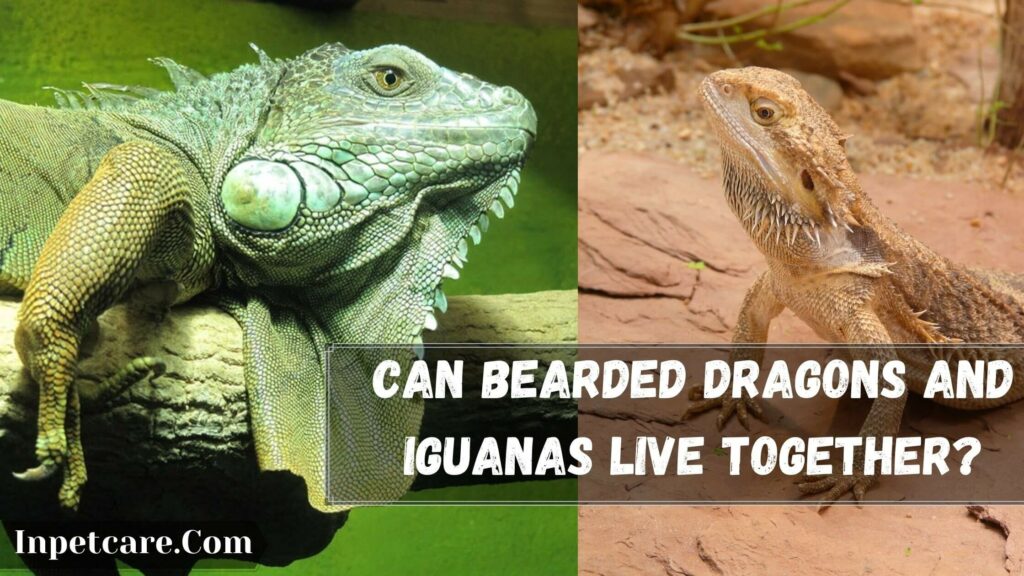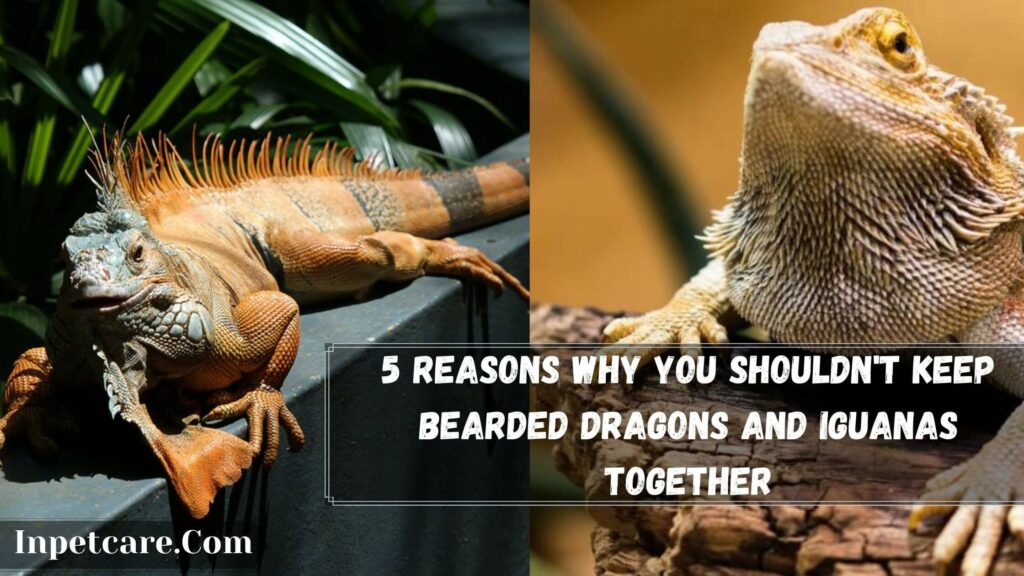If you are just like me, then you know exactly how hard it can be to choose between two of your favorite reptiles. If you already have a bearded dragon and want to get a new one, you may think of Iguana. Before you adopt an Iguana or a bearded dragon for an existing enclosure, you should know what they would be the consequences.
Thus, in this article, I will answer the very fun question: Can bearded dragons and iguanas live together?. Before I give you a quick answer to the question, it is essential to learn that most reptiles, especially males, tend to be highly territorial.
If you keep two males in the same enclosure, a territorial fight will happen. Therefore, you should carefully choose between pets when housing two in the same tank. If you don’t know how aggressive bearded dragons or Iguanas can be if kept in the tank, then there is what you need to know.
Post Contents
Can Bearded Dragons And Iguanas Live Together?

No. Bearded dragons and iguanas cannot live together in the same tank. This is a huge safety risk for your Dragons, but there are also various requirements for each of them that makes housing them together pretty much infeasible. In addition to that, bearded dragons and iguanas are natural enemies.
That also means they shouldn’t be kept together as they will start a typical fight for your attention. Sometimes, people claim that they have successfully kept both the reptiles together without any problem, but it is not entirely true.
After watching several videos on YouTube of a bearded dragon and Iguana chilling in the same enclosure, if you are curious, then be calm first. An Iguana or a bearded dragon can get along if they are raised alongside each other just from the beginning when they were young.
But, there will still be a chance of accidents or fights. Those videos were captured when the owner was monitoring both the lizards. Iguana needs a hot, humid environment, whereas a bearded dragon needs hot, dry circumstances. So, They cannot coexist together. There is a significant size difference also.
An Iguana is more giant than a bearded dragon and can easily hurt it. In addition, if you keep an adult Iguana with a juvenile bearded dragon, it may result in your baby beardies becoming the lunch of the Iguana. Furthermore, both of them can get highly stressed, which can, in turn, lead to various health issues as well.
Just for you, I have assembled your ultimate look at both reptiles in this head to head back breakdown of beardies, and Iguana needs when kept in the same tank. Let’s look at why you should never keep the beardies and iguanas together in the same tank.
5 Reasons Why You Shouldn’t Keep Bearded Dragons And Iguanas Together

Lifespan.
When we talk about the lifespan of a bearded dragon, it usually has an average life expectancy of around 7 to 12 years. On the other hand, when we talk about the life expectancy of Iguana, they live comparatively longer than Dragons, with an average lifespan of around 12-15 years. Some iguanas have also been seen living for almost 20 years or more, depending on the care they get.
Intelligence.
In terms of intelligence, reptiles are pretty much the same. Both can recognize their owner’s faces and voices. However, they have different ways of expressing what they’re feeling. Bearded dragons use unusual body movements and activities like head bobbing, and gasping & more to exhibit what they are feeling. At the same time, Iguana displays a variety of actions that will aid in their comprehension.
Size.
Bearded dragons are tiny lizards, whereas iguanas are giant lizards. A bearded dragon comes with a very docile body that is easy to crush until a few months old. Whereas iguanas have a sturdy physique, making them easy to handle. Therefore keeping them together may result in your dragon getting hurt or injured very badly.
An Iguana will be able to overpower a bearded dragon in the same enclosure easily. With their long tails, Iguana can even break or kill your bearded dragon at any moment if they are threatened or aggressive. Never leave either of your pet in the same room unattended.
Appearance.
Iguana comes have different species, whereas bearded dragons are available in different morphs. The Bearded dragon also looks adorable and spiky, whereas the Iguana has spikes running over its head, back, and tail. Both have shed scales once or twice a year, depending on the enclosure environment.
Diet.
This is probably the most significant difference between both the reptiles. Bearded Dragons are considered omnivorous and forage on plant matters, green, and insects also. On the other hand, iguanas are strictly herbivorous and prefer foraging on fruits, veggies, flowers, and Greens.
Iguana only eats plants, whereas bearded dragons need both insects and plants. Feeding both of them in the same enclosure will be a lot of a task. Adding to that, an insect may even bite your Iguana, causing infections. Both the reptiles are best when kept in a separate cage.
Heat Need
As You Already Know, both the reptiles need a hot basking area of approximately 100 degrees Fahrenheit. However, in most cases, a bearded dragon also needs an under-tank heating pad to keep itself warm in winter or at night. Whereas Iguana only needs overhead heating, it can be challenging to manage the reptiles in the same enclosure during the winter or at night.
Humidity Need
In this area, both the reptiles need different humidity levels. Bearded dragons being native to the desert, need relatively low humidity levels of around 25-40% in the enclosure.
On the other hand, when we talk about the most common species of Iguana, they are native to tropical rainforests, which require a humidity level of around 65-70% in their enclosure. For Iguana, a humidifier may be necessary as it is frequently required.
Brumation
It will be fine as long as the bearded dragon is less than a year old. After beardies reach sexual maturity, they are likely to go into brumation for at least 2-3 months. You can keep your bearded dragon from brumation by keeping the temperature inside their enclosure constant.
When we talk about iguanas, they never brumate. Therefore, if your bearded dragon ends up brumating in the same enclosure where Iguana is also residing, it may attack or injure the beardie anytime. The bearded dragon will have no chance of defense since it is brumating.
Beginner & Kid Friendly
If we talk about bearded dragons, they are one of the most amazing reptiles to start with as a pet. They are also very docile and gentle, famous for not biting or scratching you. It can make excellent friends with kids. On the other hand, if we talk about iguanas, they’re inappropriate for beginners or kids.
In the breeding or mating season, they can be highly unpredictable. With solid claws and fangs, they can bite and scratch you if they feel intimidated, stressed, or threatened. But, they can also be a great pet to an experienced keeper who understands their behavior.
Conclusion
Iguanas are comparatively powerful, fast, and more aggressive than the bearded dragon. Plus, they can easily break limbs of beardies with their flapping tail. You should never prefer keeping them together in the same enclosure.
As you can see above, it is nearly impossible for the reptiles to be housed together, and their differences are too enormous to ignore by any responsible owner. You already know that Iguanas can be more difficult to manage in many ways than bearded dragons.
Alternatively, you can choose other reptiles to keep with beardies, but iguanas are better alone in a separate cage. I have tried my best to give you all the information about can bearded Dragons and iguanas live together. If you like our article, then share it. Your one share can save many people from keeping both the pets together while ensuring both are safe in their separate cages and live a long healthy life.

94% of pet owners say their animal pal makes them smile more than once a day. In 2007, I realized that I was made for saving Animals. My father is a Vet, and I think every pet deserves one. I started this blog, “InPetCare”, in 2019 with my father to enlighten a wider audience.
